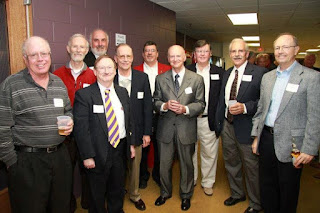I
don’t know if it’s a trait peculiar to Minnesotans or if other folks around the
country play the same mind game. It’s wrapped up in seemingly innocent
innocuous questions upon first meeting someone new. Coy and clever they’re not,
probing they are. More on that a bit later.
I
have a theory that where we grew up and how says so much about who we’ve become
later in life.
Probably
more so than the schools attended, degree earned or current mailing address
again. I’ve put a scalpel to that
question in past blogs such as ‘In the Company of Old Men’ and ‘The Final
Tabulation. Even a trip back in time to ‘Something for Judy’ attempted to pry
open the bones of past lives and my formative years.
There
was a popular saying after World War One. “Once they’ve been to old Paris,
they’ll never go back to the farm again.” Yet deep down I think they were still
rural folks despite their exposure to the greater world around them.
Sharon
is proud of her rural upbringing and farming heritage. For several years she
attended the proverbial one-room school house and had to walk, winter and
summer, down a gravel road to get there.
At
a recent luncheon of Cretin High School alumni, I also got the impression that
it didn’t really matter if we were raised on the East Side, the West Side or middle-class
communities in-between.
We
all attended Cretin in the late fifties. It wasn’t SPA or St. Thomas but it
wasn’t just any old school either. I knew where I fit in back then but that
doesn’t matter anymore. Cretin was a special place back then and that’s all
that really mattered.
The
same can be said of my Mother and her relatives. I always had the distinct
impression that my relatives from outstate Minnesota (St. Martin, Melrose and
Sterns County) embraced the fact that they were not from the cities. They were
proud of their rural heritage and never hesitated to criticize ‘those city
folks’ for their lack of understanding of one issue or another.
But
not everyone feels the same way about social class and boundaries. Stepping
outside of that cloak of unwritten social boundaries has always raised the
eyebrows of some folks. Sharon’s mother experienced it in my blog ‘The Girl with
Seven Suede Jackets.’ In my novel ‘Love in the A Shau’ the protagonist, Daniel,
is confronted by his mother who warns him not to attempt moving outside of his
social-economic upbringing. ‘They aren’t our kind of people’ she warns him.
Daniel’s mother knows her place as did my mother even though it was a
self-imposed boundary.
I’ve
thought about a book I’ll probably never write. It would be entitled: ‘Growing up
at Randolph and Hamline.”
 |
| Randolph & Hamline - Photo Credit: Jerry Hoffman |
 |
| The Old Gang - Photo Credit: Jerry Hoffman |
 |
| High School Dance - Photo Credit: Jerry Hoffman |
There
are literally hundreds of stories out there of young people growing up in my
neighborhood in the Fifties. It was solid middle class, religious, traditional
and on the cusp of radical change as the loaming clouds of the Sixties formed
just over the horizon. We all knew where we came from. It wasn’t Edina or Minnetonka
but it wasn’t a poor part of town either.
Now
about those seemingly off-the-cuff innocent questions meant to solidify social
connections. ‘Where do you live’ is a fair question if you haven’t seen them in
the neighborhood. ‘Where did you go to school’ is about as stealthy a question
as a well-aimed sniper’s bullet. We all know what you’re getting at there! I
think it is basic human nature in all its frailty that tempts us to compare where
other folks grew up and where they went to school with our own upbringing. It
is foolish and questionable and is never guaranteed to lead to a solid
conclusion. But we do it anyway.
Rich
people like to believe that pedigree says it all. Just as cash doesn’t equate
to class so to being born to the ‘right people’ simply means one had options
and opportunities not available to the rest of us. And that’s about it. I don’t
think it is uniquely American to assume that those with financial resources are
a level above the rest of us. They just think they are. And given their
preponderance for divorce, alcoholism, drug-abuse, and infidelity, I’d hardly
say those are role models for us to follow.
All
of which swings around one hundred and eighty degrees to my Cretin classmates
of the class of 1961. Whether we were aware of our social-economic-intellectual
ranking was back then I’ll never know. I’m guessing most of us knew it at one
level or another. Yet there was that sharing experience of high school with all
of its drama, trauma and a plethora of emotions lumped in-between. It was what
it was; the good, the bad and the wonderful (of course, unrecognized at the
time.)
Yet
at this stage of the game it doesn’t matter anymore. Most of us are still
around. Other classmates haven’t been so lucky. Most of us would admit to
having had a good life and in the end, little else matters. ‘Been there, done
that’ or ‘didn’t do that’ is no longer the competing sword of inquiry.
‘Nice
to see you again’ is a more honest equation for our lives than anything else.











No comments:
Post a Comment